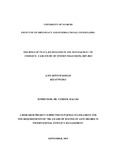| dc.contributor.author | Kosgei, Judy J | |
| dc.date.accessioned | 2016-04-21T14:01:22Z | |
| dc.date.available | 2016-04-21T14:01:22Z | |
| dc.date.issued | 2015 | |
| dc.identifier.uri | http://hdl.handle.net/11295/94680 | |
| dc.description.abstract | Whether to propagate the idea of peace or war journalism in media houses is the 21st century dilemma. The war vs. peace journalism debate has intensified than ever before.
Those between a rock and a hard place are journalists caught between reporting the story the way it is, what has been called the ‘truth’ and reporting in a manner that will quell conflict in what has been termed as peace journalism (PJ). The peace vs. war journalism headache came to live in Kenyan Newsrooms, following the 2007/ 2008 Post Election
Violence (PEV), what preceded the disputed presidential election? The role of the media in the blood bath was questioned. Various inquiries into the PEV pointed accusing fingers at the Media and it was unanimously concluded that; the media had a role. The fear in every newsroom in Kenya following the aftermath of the contested presidential election in 2007 was that history would repeat itself in the 2013 general election. The basic aim of this study therefore: is to investigate the role of peace journalism in the management of conflict in Kenya by establishing how the media changed in requirement of ‘peace journalism’. A descriptive research design was adopted in this study. The study relied on interview schedules as the main primary data collection instrument with the stratified and purposive sampling techniques employed. The Qualitative data from the respondents was organized according to the population and analyzed. Before commencement of the study, consent was sought from the Royal Media Services and the Media Council of Kenya through the University of Nairobi. The study applied the Agenda setting theory to investigate how the media employs peace journalism in their news and information dissemination. The findings of the study indicated that Majority of the respondents use their own discretion when it comes to making choices on what is best for the public to consume in times of conflict. The study however pointed out that war stories triumph in bulletins compared to peace stories with most respondents noting that, war stories are regarded as “Good Stories” that spice up the news bulletins. From the findings it is obvious that Citizen TV does not have a clear policy on conflict reporting and peace journalism hence paving way for personal judgment and reliance on the basic journalism ethics. It was recommended that a policy framework should be put in place and staff
trained on conflict reporting. | en_US |
| dc.language.iso | en | en_US |
| dc.publisher | University of Nairobi | en_US |
| dc.subject | peace journalism , management of Conflict,citizen television | en_US |
| dc.title | The Role of Peace Journalism in the Management of Conflict: Case Study of Citizen Television, 2007-2013 | en_US |
| dc.type | Thesis | en_US |

